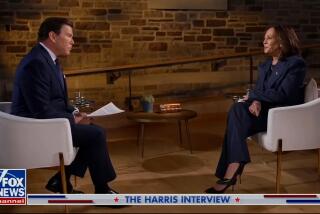TV and Obama: mutual love affair
NEW YORK — Even President Obama, a gleam in his eye as he talked at the Radio and Television Correspondents’ Assn. dinner two weeks ago, seemed to recognize the special relationship he’s forged with TV networks in the opening months of his administration.
“A few nights ago, I was up tossing and turning and trying to figure out exactly what to say,” he said. “Finally, when I couldn’t get back to sleep, I rolled over and asked Brian Williams what he thought.”
The reference to the NBC anchor and host of the prime-time “Inside the Obama White House” special this spring drew loud laughter.
There’s no denying that broadcast networks and the president have occasionally worked for their mutual benefit: Obama gets public platforms for his ideas and the networks get programming that delivers strong ratings at a time when that’s hard to come by.
“Inside the Obama White House” was a hit, costing relatively little to produce, for a network that’s starved for hits. The two-part series was rerun the same week that it originally aired.
Two of the three most-watched episodes of “60 Minutes” last TV season were devoted to Obama, topped by the 25.1 million people who watched Steve Kroft conduct the first postelection interview with the president-elect in November.
An interview with Obama’s brain trust that aired a week earlier drew 18.5 million viewers, and another Obama interview in March had 17 million viewers. The season average for the CBS newsmagazine was 14.3 million, Nielsen Media Research said.
CBS’ “Face the Nation” had its biggest audience of the year when Obama appeared on March 29.
The dry subject matter of ABC’s prime-time discussion with the president on healthcare last month meant it wasn’t a big hit, but it still did better in its time slot than anything else ABC had put on in six weeks. The “Nightline” that completed the discussion that night beat David Letterman and Conan O’Brien in the ratings.
“Obama should change his middle name from Hussein to Nielsen,” said Gail Shister, a writing instructor at the University of Pennsylvania.
The idea of a president who grabs ratings still seems strange, as does the notion that a network will need him. Yet Obama has been reliable when so many other things that broadcasters have been trying are failures.
Strong public interest in the president and his policies explains why so many people in television, magazines and newspapers want to speak to him, said Mark Whitaker, Washington bureau chief for NBC News.
Jon Banner, veteran executive producer of ABC’s “World News,” said the White House has clearly sought to make Obama more available to networks than recent presidents have been. Obama is personally popular, more so than his policies at this point, and he’s his own best salesman, he said.
The network says it does not play favorites. It said the Bush administration turned down several invitations for town hall-style meetings similar to the one ABC recently organized for Obama.
The mutual star-making machinery may not last forever, however. As Obama holds more news conferences -- many of them dry and lawyerly -- the viewership is going down. Networks like exclusive opportunities to do things their competitors haven’t but are no longer happy running prime-time news conferences.
“Some of the blockbuster ratings appeal is starting to wear off a little,” Whitaker said.
More to Read
The biggest entertainment stories
Get our big stories about Hollywood, film, television, music, arts, culture and more right in your inbox as soon as they publish.
You may occasionally receive promotional content from the Los Angeles Times.










